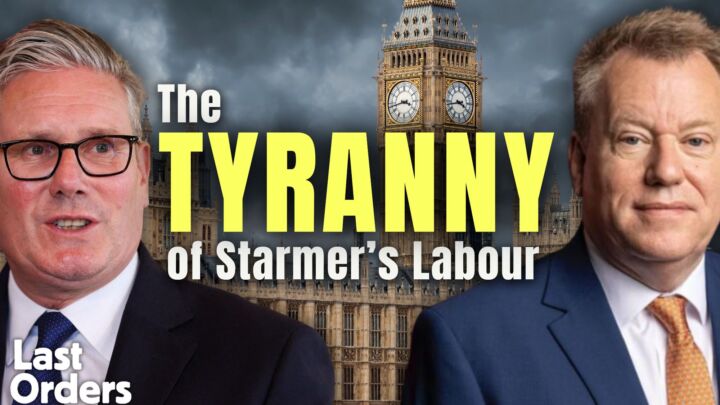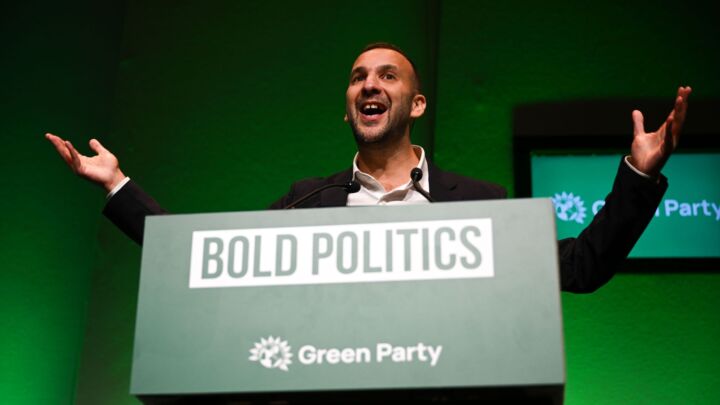This is not austerity
The A-word is distracting us from addressing the real economic malaise.

Want unlimited, ad-free access? Become a spiked supporter.
It is widely accepted that Britain’s coalition government, like many of its counterparts across the developed world, is willfully imposing harsh austerity on the public. In this view, the government is subjecting the population to an ideologically motivated squeeze on living standards in a desperate bid to balance its finances. Widespread misery and hardship are portrayed as the inevitable result.
Unfortunately, this version of events is seldom questioned. Its rare critics tend to be fiscal hawks who argue that current spending cuts are insufficiently severe. There is an urgent need to interrogate the notion of austerity to draw out its underlying assumptions more clearly.
This is not to deny that many people are suffering from a squeeze on their living standards. On the contrary, it is to argue that what is happening is in many respects worse than generally recognised. Many have suffered stagnating incomes for a decade or so, and, even worse, the public is becoming increasingly marginalised from the democratic process.
This is one of those times where it helps to start by defining terms. The Oxford English Dictionary website defines austerity as: ‘Difficult economic conditions created by government measures to reduce public expenditure.’ Although economists typically add more jargon, this gets to the heart of the matter.
The definition is generally taken to embody three questionable assumptions: that public spending is being cut; that this reduction is the main force behind falling living standards; and that the economic malaise is essentially cyclical or short-term. Let’s examine each premise in turn.
First, the assertion that the government is cutting public spending, although not entirely false, is grossly misleading. A little historical perspective helps put the cuts in their proper context.
It is true that the Conservative-led coalition was elected to government in May 2010 on a programme that included public-spending cuts. Only it preferred the coy language of reducing the deficit – that is, the amount the government borrows each year – and promoting fiscal responsibility. Nowadays, the preferred jargon often refers to fiscal consolidation.
It is important to remember that in 2010, the UK Labour Party did not oppose spending cuts in principle. Instead it argued that the government’s fiscal retrenchment was reckless and premature. In other words, Labour claimed it would have made its implementation of cuts more gradual if it had won the election. Indeed, the Labour government’s final budget, introduced in March 2010, was already promoting ‘savings’ in public spending. The differences between all the main parties in relation to economic policy are much smaller than widely assumed.
There was a consensus that recovery should not be far off. If there were differences, they focussed on exactly when it was likely to arrive. After the economic contraction of 2008/2009, all the main parties assumed the economy would be able to turn the corner before too long. From that perspective, it seemed that public spending, which had surged during the recession, could be gradually reduced from its 2009/2010 peak.
Just before the emergence of the recession in 2008, the level of state spending in the UK – what is technically called total managed expenditure – was running at slightly below 40 per cent of GDP (39.9 per cent in the 2007/2008 financial year, according to the official Office for Budget Responsibility data). With the onset of the recession, it rose to a peak of 45.3 per cent in 2009/2010, while the level forecast for the current financial year is 42.5 per cent. Public spending had surged during the economic contraction as more money was pumped into the economy. In addition, the amount spent on what economists call ‘automatic stabilisers’, such as unemployment benefit, also rose as the economic situation deteriorated. According to the most recent budget – and this assumes the government will be successful in meeting its plans – it will not be until 2017/2018 that spending will be lower in real terms than it was a decade earlier.
So the government has made cuts in its total spending if these are measured from its peak at the end of the last decade. But in historical terms, this year’s level of spending remains high. Leaving aside the exceptional period from 2008 to 2012, the last time public spending exceeded the current level in real terms was in 1986/1987. The first part of the definition of austerity – that the government is trying to reduce public spending – should be highly qualified.
Second, the implication that recent cuts in public spending are responsible for stagnating living standards is misleading. The relationship between these two factors is not clear-cut. Living standards in Britain have in some respects deteriorated for a decade or so – predating the recent surge and subsequent fall in public spending.
According to a study by the Resolution Foundation, a think tank, median wages flatlined and disposable incomes fell in every English region outside of London from 2003 to 2008. So for a large section of the population, the squeeze on living standards predated the talk of austerity by several years. The parallel trend in America and Germany goes even further back.
It is true that spending cuts in certain areas, such as local authorities, have hit living standards. This does not necessarily translate into a drop in individual incomes, but it often means that the quality of public services has deteriorated. Benefit cuts can mean falling living standards for many, too.
However, the key driver in stagnating living standards for the bulk of the population is the lack of earnings growth. According to official statistics, real wages have fallen in real terms since 2009. By last year they had dropped to their level of a decade earlier. This trend was already becoming apparent to many before the peak in government spending.
Finally, Britain’s economic weakness is primarily structural rather than cyclical. In other words, it is not simply a short-term glitch that will fade away as recovery materialises. Nor can it be explained in terms of malevolent government policy or the callous pursuit of neoliberal ideology. It reflects, instead, a lack of underlying economic dynamism.
Those who favour the term austerity often condemn those who advocate spending cuts as austerians. Behind this derogatory label is the Keynesian assumption that the drive to cut the deficit at this stage is ideologically driven. If only the austerians would wait until a recovery emerges, then, so many Keynesians argue, it would be the right time to impose cuts.
This ignores the deep-rooted character of the West’s economic malaise. As Phil Mullan argued in a spiked essay in June, the average rate of economic growth started to fall in the 1970s and has dropped in every subsequent decade. This has been accompanied by low levels of investment and a poor record on innovation.
The Keynesian response is essentially to keep trying to postpone initiatives to tackle these structural weaknesses into the future. Rather than work out how best to promote economic restructuring and expansion, the emphasis is on muddling through by pumping money into the economy. The result is that fundamental economic problems never get resolved. They simply reemerge at a higher and more destructive level.
One result of this failure is that future increases in average living standards are likely to be weak at best. Poor economic growth is generally translated into a slow rise in household incomes. The government’s muddling-through approach is a key factor underlying aneamic growth.
So, characterising the period since 2010 as one of austerity is misleading. Public spending remains high, incomes had already started to stagnate before that year’s election, and the economic malaise is structural rather than cyclical.
However, there is one additional and arguably even more important reason for refusing to describe the recent period as one of austerity. That is not because of what the label includes but what it excludes. Critics of austerity fail to see any problem with the increasing marginalisation of the public from the democratic process. On the contrary, it is often a development that they welcome as a necessary precondition for economic stability.
There are countless examples of public disenfranchisement, but in the economic sphere perhaps the most blatant is the move towards independent central banking. It is often forgotten that until 1997, an elected politician set interest rates in Britain: the chancellor of the exchequer. This was important, as it meant they were directly accountable to an elected parliament.
The shift to letting central bankers set rates was made with the explicit goal of insulating an important part of economic policy from public pressure. Advocates of central-bank independence argued that there was a danger that politicians might be tempted to keep interest rates artificially low. The underlying assumption was that they would be tempted to kowtow to a supposedly greedy and foolish public.
Yet since 1997, central bankers have come to play an ever-more central role in economic policy. Not only do such elite technocrats set interest rates – they also feel free to make public pronouncements on fiscal policy, too. Elected politicians seem to want to outsource as many decisions as possible to the technocracy.
The charge of austerity misconstrues the economic challenges facing Britain and the West more generally. Not only is the economic malaise more deep-rooted than generally assumed, but the public is routinely excluded from democratic debate.
Daniel Ben-Ami is a writer based in London. Visit his website here. An expanded version of Ferraris for All, his book defending economic prosperity, is available in paperback (Buy this book from Amazon (UK)).)
You’ve read 3 free articles this month.
Support spiked and get unlimited access.
Help us hit our 1% target
spiked is funded by readers like you. It’s your generosity that keeps us fearless and independent.
Only 0.1% of our regular readers currently support spiked. If just 1% gave, we could grow our team – and step up the fight for free speech and democracy right when it matters most.
Join today from £5/month (£50/year) and get unlimited, ad-free access, bonus content, exclusive events and more – all while helping to keep spiked saying the unsayable.
Monthly support makes the biggest difference. Thank you.









Comments
Want to join the conversation?
Only spiked supporters and patrons, who donate regularly to us, can comment on our articles.